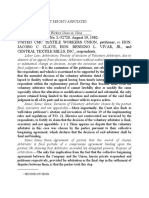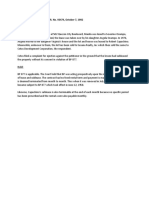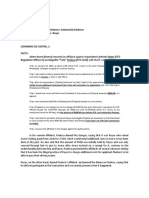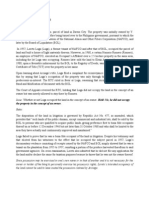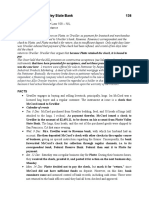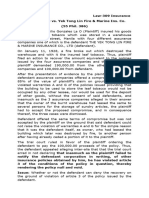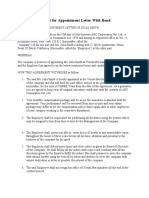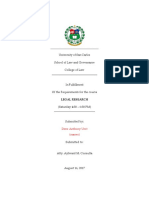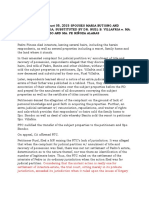G R - No - L-15315
G R - No - L-15315
Uploaded by
RywCopyright:
Available Formats
G R - No - L-15315
G R - No - L-15315
Uploaded by
RywOriginal Description:
Original Title
Copyright
Available Formats
Share this document
Did you find this document useful?
Is this content inappropriate?
Copyright:
Available Formats
G R - No - L-15315
G R - No - L-15315
Uploaded by
RywCopyright:
Available Formats
G.R. No.
L-15315
ABUNDIO MERCEDvs. HON. CLEMENTINO V. DIEZ, ETC. ET AL.,
FACTS:
On January 30, 1958, Abundio Merced filed a complaint for annulment of his second marriage with Elizabeth Ceasar.
The complaint alleges that defendant Elizabeth Ceasar and her relatives forced, threatened and intimated him into
signing an affidavit to the effect that he and defendant had been living together as husband and wife for over five
years, which is not true; that this affidavit was used by defendant in securing their marriage of exceptional character,
without the need for marriage license; that he was again forced, threatened and intimated by defendant and her
relatives into entering the marriage with her.
That immediately after the celebration of the marriage plaintiff left defendant and never lived with her; that the
defendant wrote him on October 29, 1957, admitting that he was forced into the marriage and asking him to go to
Cebu to have the marriage annulled, but he refused to go for fear he may be forced into living with the defendant.
Merced prays for annulment of the marriage and for moral damages in the amount of P2,000. Elizabeth Ceasar filed
her answer to the complaint. In her answer, she denies the material allegations of the complaint and avers as
affirmative defenses that neither she nor her relatives know of plaintiff's previous marriage to Eufrocina Tan.
That sometime in July, 1957, plaintiff asked her mother to intercede on their behalf to secure her father's consent to
their marriage as plaintiff could not concentrate on his studies without marrying Elizabeth, but that her mother advised
him to finish his studies first; defendant learned that plaintiff was engaged to marry Eufrocina Tan, but plaintiff, upon
being confronted with such discovery, showed her a letter which he wrote breaking off his engagement with Tan.
As a counterclaim defendant asks P50,000 as moral damages for the deceit, fraud and insidious machinations
committed upon her by plaintiff. Defendant Elizabeth Ceasar filed a criminal complaint for bigamy against plaintiff
Abundio Merced with the office of the City Fiscal of Cebu. Assistant City Fiscal filed Criminal, charging Merced with
bigamy for the second marriage.
Abundio Merced filed a motion to hold to trial of said criminal case in abeyance until final termination of Civil Case.
Reason alleged for the motion is that the Civil Action involves facts which if proved will determine the innocence of
the accused. After an opposition thereto was filed by the assistant provincial fiscal, the court granted the motion.
However, upon motion for reconsideration filed by the fiscal, the order was set aside and another entered denying the
motion of accused for suspension of the criminal proceedings, which last order is the one sough herein to be annulled.
ISSUE:
Whether or not an action to annul the second marriage is a prejudicial question in a prosecution for bigamy.
RULING:
Yes. In order that a person may be held guilty of the crime of bigamy, the second and subsequent marriage must have
all the essential elements of a valid marriage, were it not for the subsistence of the first marriage. One of the essential
elements of a valid marriage is that the consent thereto of the contracting parties must be freely and voluntarily given.
Without the element of consent a marriage would be illegal and void. But the question of invalidity cannot ordinarily
be decided in the criminal action for bigamy but in a civil action for annulment. Since the validity of the second
marriage, subject of the action for bigamy, cannot be determined in the criminal case and since prosecution for bigamy
does not lie unless the elements of the second marriage appear to exist, it is necessary that a decision in a civil action
to the effect that the second marriage contains all the essentials of a marriage must first be secured.
The issue of the validity of the second marriage, which must be determined beforehand in the civil action, before the
criminal action can proceed. We have a situation where the issue of the validity of the second marriage can be
determined or must be determined in the civil action before the criminal action for bigamy can be prosecuted. The
question of the validity of the second marriage is, therefore, a prejudicial question, because determination of the
validity of the second marriage is determinable in the civil action and must precede the criminal action for bigamy.
You might also like
- Sales Case Nos. 71 To 90Document85 pagesSales Case Nos. 71 To 90Arlando G. ArlandoNo ratings yet
- The Haryana Urban Rent Control ActDocument55 pagesThe Haryana Urban Rent Control Actrenu tomar100% (3)
- Malayan vs. Phil. First Insurance (676 SCRA 268) (Digest)Document2 pagesMalayan vs. Phil. First Insurance (676 SCRA 268) (Digest)Michelle LimNo ratings yet
- United CMC Textiles Workers Union v. ClaveDocument11 pagesUnited CMC Textiles Workers Union v. ClavetheagNo ratings yet
- Spouses Eduarte Vs CADocument1 pageSpouses Eduarte Vs CACedricNo ratings yet
- Legal Forms - Case DoctrinesDocument20 pagesLegal Forms - Case DoctrinesJosh PabustanNo ratings yet
- GR No. 107967 Case DigestDocument2 pagesGR No. 107967 Case DigestRaym TrabajoNo ratings yet
- People vs. Canlas (372 SCRA 401)Document3 pagesPeople vs. Canlas (372 SCRA 401)gokudera hayatoNo ratings yet
- Alrai v. Maramion DigestDocument3 pagesAlrai v. Maramion DigestTrisha Paola TanganNo ratings yet
- United EU Gelmart Industries Vs NorielDocument4 pagesUnited EU Gelmart Industries Vs NorielJohnday MartirezNo ratings yet
- B13 Philippine Bank of Commerce Vs Court of AppealsDocument2 pagesB13 Philippine Bank of Commerce Vs Court of AppealsJ CaparasNo ratings yet
- Credit TransDocument83 pagesCredit TranssarNo ratings yet
- Ejectment: Prescription, Possession, Not Ownership Quevada V. Court of Appeals 502 SCRA 233 FactsDocument18 pagesEjectment: Prescription, Possession, Not Ownership Quevada V. Court of Appeals 502 SCRA 233 FactsColeenNo ratings yet
- Manila Mahogany MFG Corp V CADocument1 pageManila Mahogany MFG Corp V CAJeperson MarcoNo ratings yet
- Cabales vs. Court of AppealsDocument2 pagesCabales vs. Court of AppealshbcgNo ratings yet
- Santos vs. Mojica Case DigestDocument7 pagesSantos vs. Mojica Case Digestermeline tampusNo ratings yet
- Llanto Vs AlzonaDocument7 pagesLlanto Vs AlzonaRuth GaleraNo ratings yet
- Case 1Document8 pagesCase 1mario navalezNo ratings yet
- Perla V RamoleteDocument2 pagesPerla V RamoleteiptrinidadNo ratings yet
- Litonjua Vs LDocument2 pagesLitonjua Vs LKling KingNo ratings yet
- #55 Apex Mining Co vs. Southern Mindanao Gold Mining Corp.Document4 pages#55 Apex Mining Co vs. Southern Mindanao Gold Mining Corp.Georgette V. SalinasNo ratings yet
- Juerez v. Court of Appeals, G.R. No. 93474, October 7, 1992Document1 pageJuerez v. Court of Appeals, G.R. No. 93474, October 7, 1992Eli SNo ratings yet
- Oblicon Week 13Document3 pagesOblicon Week 13Julius ManaloNo ratings yet
- 3.5 Coca-Cola Bottlers v. Quintin J. GomezDocument1 page3.5 Coca-Cola Bottlers v. Quintin J. Gomezmary grace banaNo ratings yet
- Corpo Full CasesDocument105 pagesCorpo Full CasesGGT InteriorsNo ratings yet
- Succession - Sicad v. CA (When Donor RETAINS Right To Dispose Until After Death, It's Mortis Causa)Document14 pagesSuccession - Sicad v. CA (When Donor RETAINS Right To Dispose Until After Death, It's Mortis Causa)kjhenyo2185020% (1)
- F1v - 1 Office of The Ombudsman v. ReyesDocument2 pagesF1v - 1 Office of The Ombudsman v. ReyesAaron AristonNo ratings yet
- NPC v. GONONGDocument2 pagesNPC v. GONONGJustineNo ratings yet
- Rule 114, 115 & 116 CasesDocument41 pagesRule 114, 115 & 116 CasesfatimasenNo ratings yet
- St. Michael School of Cavite Inc. v. MasaitoDocument10 pagesSt. Michael School of Cavite Inc. v. Masaitojuju_batugalNo ratings yet
- Aranda Vs CADocument3 pagesAranda Vs CAdayneblazeNo ratings yet
- La Mallorca Vs CADocument3 pagesLa Mallorca Vs CAtwenty19 lawNo ratings yet
- Senate Resolution 1336Document4 pagesSenate Resolution 1336PortCallsNo ratings yet
- Case Digest - Aldovino Vs ComelecDocument2 pagesCase Digest - Aldovino Vs ComelecJohanna Mae L. AutidaNo ratings yet
- JOSE MA. T. GARCIA, Petitioner, v. COURT OF APPEALSDocument1 pageJOSE MA. T. GARCIA, Petitioner, v. COURT OF APPEALSmark anthony mansuetoNo ratings yet
- Producers Bank of The Phils Vs VivesDocument10 pagesProducers Bank of The Phils Vs VivesAbbygaleOmbaoNo ratings yet
- Luga vs. ArciagaDocument1 pageLuga vs. Arciagabananacue_No ratings yet
- Gil Vs Murciano - 16th Case Under Notarial WillDocument1 pageGil Vs Murciano - 16th Case Under Notarial WillRalph Valdez100% (1)
- Tabuena VS SandiganbayanDocument2 pagesTabuena VS SandiganbayanNaif OmarNo ratings yet
- 7 Litonjua vs. EternityDocument24 pages7 Litonjua vs. EternityRaiya AngelaNo ratings yet
- 136 Urwiller V Platee Valley State BankDocument2 pages136 Urwiller V Platee Valley State BankZoe VelascoNo ratings yet
- Ong VS CaDocument6 pagesOng VS CaLena BeeNo ratings yet
- 14.stolt Nielsen V SulpecioDocument15 pages14.stolt Nielsen V SulpecioEmaleth LasherNo ratings yet
- Davao Vs CastilloDocument1 pageDavao Vs CastilloEdward Kenneth KungNo ratings yet
- Natalia Carpena Opulencia c7Document2 pagesNatalia Carpena Opulencia c7Jay Veracruz BugayNo ratings yet
- Catalan V BraganzaDocument2 pagesCatalan V BraganzaKarla EspinosaNo ratings yet
- Republic Vs KhoDocument2 pagesRepublic Vs KhoXyzaPaolaOrtizNo ratings yet
- Priscilla Alma Jose v. Ramon Javellana FactsDocument6 pagesPriscilla Alma Jose v. Ramon Javellana FactsRae ManarNo ratings yet
- 1 Kauffman Vs PNB (42 Phil 182, 29 September 1921)Document5 pages1 Kauffman Vs PNB (42 Phil 182, 29 September 1921)Lira HabanaNo ratings yet
- G.R. No. 126950Document2 pagesG.R. No. 126950Bluebells33No ratings yet
- Anita Reyes-Mesugas vs. Alejandro Aquino ReyesDocument3 pagesAnita Reyes-Mesugas vs. Alejandro Aquino ReyesjoantogoresNo ratings yet
- Dreamwork V. Janiola: Prejudicial QuestionsDocument40 pagesDreamwork V. Janiola: Prejudicial QuestionsEryl YuNo ratings yet
- Cebu Royal PlantDocument1 pageCebu Royal Plantaags_06No ratings yet
- Gonzalez La O vs. Yek Tong Lin Fire & Marine Ins. Co.Document2 pagesGonzalez La O vs. Yek Tong Lin Fire & Marine Ins. Co.Minglana KarlNo ratings yet
- Case 28 Laborte Et Al. vs. Pagsanjan Tourism Consumers' Corp Et Al (Jan 2014)Document2 pagesCase 28 Laborte Et Al. vs. Pagsanjan Tourism Consumers' Corp Et Al (Jan 2014)Frances Abigail BubanNo ratings yet
- People VDocument18 pagesPeople VAnonymous NqaBAyNo ratings yet
- Case Laws in InjunctionDocument18 pagesCase Laws in Injunctionjim peterick sisonNo ratings yet
- E-No. 8 Merced v. DiezDocument2 pagesE-No. 8 Merced v. DiezsabethaNo ratings yet
- Merced Vs DiazDocument2 pagesMerced Vs DiazsabethaNo ratings yet
- G.R. No. L-15315 (Merced v. Diez)Document4 pagesG.R. No. L-15315 (Merced v. Diez)VIRILITER AGITENo ratings yet
- ObliCon DigestMidterms RANDocument15 pagesObliCon DigestMidterms RANRaziel Xyrus FloresNo ratings yet
- RRB 2NDSMDocument1 pageRRB 2NDSMRywNo ratings yet
- Ble 5Document3 pagesBle 5RywNo ratings yet
- 231896Document19 pages231896Ryw100% (1)
- BLE 1-7 (Digests)Document6 pagesBLE 1-7 (Digests)RywNo ratings yet
- G.R. No. 203754Document4 pagesG.R. No. 203754Ryw100% (1)
- Maynilad Water Services V Secretary of Denr GR 202897 206823 207969 August 6 2019Document6 pagesMaynilad Water Services V Secretary of Denr GR 202897 206823 207969 August 6 2019Ryw100% (1)
- Baguilat-v.-AlvarezDocument2 pagesBaguilat-v.-AlvarezRywNo ratings yet
- Republic v. Cuison MelgarDocument1 pageRepublic v. Cuison MelgarRywNo ratings yet
- Aldaba-Vs-ComelecDocument2 pagesAldaba-Vs-ComelecRyw100% (1)
- Yu V Reyes Carpio DigestDocument2 pagesYu V Reyes Carpio DigestRywNo ratings yet
- MALLION v. ALCANTARADocument1 pageMALLION v. ALCANTARARywNo ratings yet
- Art 2. Sec. 1-6 Cases (CL1)Document196 pagesArt 2. Sec. 1-6 Cases (CL1)RywNo ratings yet
- Maquilan v. MaquilanDocument2 pagesMaquilan v. MaquilanRywNo ratings yet
- Implied Terms in Construction ContractsDocument2 pagesImplied Terms in Construction ContractsRandolph ChanNo ratings yet
- Appointment Letter With BondDocument2 pagesAppointment Letter With BondAnsh ArvindNo ratings yet
- Legal Research MidtermsDocument7 pagesLegal Research MidtermsDave UrotNo ratings yet
- Right To Information: HELD: Supreme Court Held That Copies of Examinee Writing Public Examination Conducted byDocument1 pageRight To Information: HELD: Supreme Court Held That Copies of Examinee Writing Public Examination Conducted byRashmiPandeyNo ratings yet
- Easement of Light and ViewDocument13 pagesEasement of Light and Viewkook0% (1)
- United States Court of Appeals, Tenth CircuitDocument4 pagesUnited States Court of Appeals, Tenth CircuitScribd Government DocsNo ratings yet
- 6 Mercado V NLRCDocument1 page6 Mercado V NLRCRalph VelosoNo ratings yet
- Southeast Mindanao V Balite PortalDocument2 pagesSoutheast Mindanao V Balite PortalGracia SullanoNo ratings yet
- 6 People V DaganiDocument24 pages6 People V DaganiKarren QuilangNo ratings yet
- Cancellation of Patents and Substitution of PatenteeDocument2 pagesCancellation of Patents and Substitution of PatenteeMeghan Kaye LiwenNo ratings yet
- Ammendment of BRADEA Section 4Document25 pagesAmmendment of BRADEA Section 4RANDAN SADIQNo ratings yet
- Philippine Charter Insurance Corporation vs. Neptune Orient Lines/Overseas Agency Services, Inc. June 12, 2008 FactsDocument11 pagesPhilippine Charter Insurance Corporation vs. Neptune Orient Lines/Overseas Agency Services, Inc. June 12, 2008 FactsIm reineNo ratings yet
- Toland JudgementDocument8 pagesToland JudgementGreenville News100% (1)
- in The Matter of The Adoption of Stephanie Nathy Astorga GarciaDocument1 pagein The Matter of The Adoption of Stephanie Nathy Astorga GarciaDara RomNo ratings yet
- DMTDocument31 pagesDMTtabkhnNo ratings yet
- Business Law MCQDocument11 pagesBusiness Law MCQSITTI PHILINA NANINo ratings yet
- Doctrine of Colourable Legislation "What Cannot Be Done Directly Cannot Be Done Indirectly"Document2 pagesDoctrine of Colourable Legislation "What Cannot Be Done Directly Cannot Be Done Indirectly"Saytendra KumarNo ratings yet
- Foundation in CriminologyDocument38 pagesFoundation in CriminologyDave FutalanNo ratings yet
- Professional Service Contract SampleDocument5 pagesProfessional Service Contract SampleMuhammad SaqibNo ratings yet
- WP 11449 2023Document4 pagesWP 11449 2023harsh.chowdhary570No ratings yet
- Cerafica v. ComelecDocument1 pageCerafica v. ComelecMan2x SalomonNo ratings yet
- Donation Mortis Causa - SampleDocument3 pagesDonation Mortis Causa - SampleJozele Dalupang50% (2)
- Remedial Law Purple Notes 2018 - NoelDocument464 pagesRemedial Law Purple Notes 2018 - NoelIrish Ann86% (7)
- Heirs of Amada Celestial Vs Heirs of Editha CelestialDocument5 pagesHeirs of Amada Celestial Vs Heirs of Editha CelestialShiena Lou B. Amodia-RabacalNo ratings yet
- Dem-NPL FilingDocument33 pagesDem-NPL FilingRob PortNo ratings yet
- SN54LS15, SN54S15, SN74LS15, SN74S15 Triple 3-Input Positive-And Gates With Open-Collector OutputsDocument7 pagesSN54LS15, SN54S15, SN74LS15, SN74S15 Triple 3-Input Positive-And Gates With Open-Collector OutputsEden K.CNo ratings yet
- National Prosecution Service Legal FeesDocument2 pagesNational Prosecution Service Legal FeesFrederick Eboña100% (1)
- Rule69-1 Butiong vs. PlazoDocument3 pagesRule69-1 Butiong vs. PlazoCali EyNo ratings yet
- (04.a.01.c.01) People V MontealegreDocument2 pages(04.a.01.c.01) People V MontealegreMaya Tolentino100% (2)



